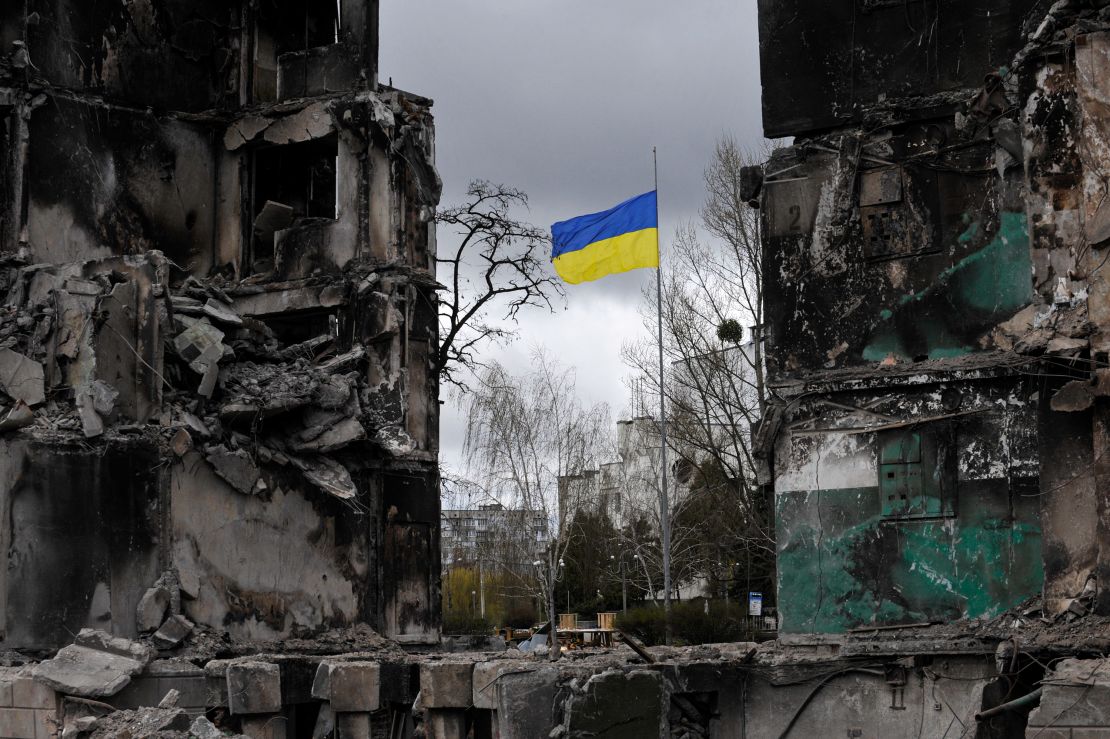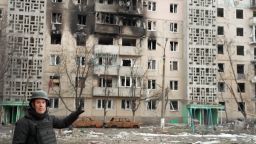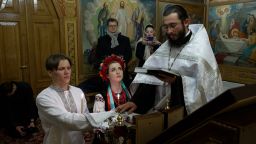If you can remember clearly the Europe of a dizzying year ago, perhaps the biggest surprise in where we find ourselves now is the extent to which the West has been reminded of its values and purpose.
Russia’s unprovoked invasion of Ukraine served as the unwitting antidote to six years of clumsy populism and the huge economic and psychological shock of the pandemic. It also worked to counter a sense that morality, and the virtue of values, were becoming obsolete in the face of the many challenges posed by the world’s crises.
It shouldn’t have taken the deaths of thousands of innocent Ukrainians, the threat of nuclear attack, and the leveling of so much of a country, to make this point. But it’s perhaps the revulsion to Putin’s brutal and inept war that helped Europe and the rest of the West rediscover a collective sense of purpose.
The eyes of three old men thrust into our van in Posad Pokhrovka, in the early days of the war, desperate to flee shelling that had torn their world apart, still haunt me: Not even the Nazis beat them like that, they said, sobbing. They never thought they’d live long enough to see worse than the 1940s.

Wars can intensify scrutiny of both sides’ conduct to the point where each can be accused of some degree of wrongdoing. So, it’s important to pause at this point and consider the ugliness of the way Russia has waged this war.
Firstly, Moscow won’t even admit that it’s at war – a sign of the fictional landscape in which it wishes to fight.
Secondly, Moscow has burned through its professional army so fast, it is press-ganging students to the front, and resorting to unleashing human waves of Russian prisoners at Ukrainian trenches. Some return in coffins, the injured are sent back to fight.
Thirdly, the lack of sophistication – or even basic self-awareness – is striking. The Russian high command doesn’t even seem to want to address how bad it is. In the background, the threat of nuclear force has been brandished so ineptly – in chest-pounding signals from a weak Kremlin which is losing the most conventional of fights – it appears to have had the almost opposite effect, galvanizing the West into concerted action in the face of what amounts to nuclear blackmail.
Ukraine’s response has been further fuel to Western unity. Ingenuity has bolstered the Ukrainians’ defense. A territorial defense fighter, known as “Graf,” could talk in Kramatorsk for hours about the complexities of syncing drone surveillance to artillery, then switch to the role of Western private contractors in the war, and end with a blistering critique on the role alcoholism and corruption would have on the bones of Russia’s nuclear program.
Ukraine is sending its best and brightest to fight, and adapting to warfare faster than imaginable, while Russia is forcing convicts to run straight into the hail of bullets from Kyiv’s machine guns.

Rusting armor
In the past year, fear of Moscow has begun to evaporate. The Cold War foe that could vaporize our world – whose warheads were the menace behind so many childhood animations and movies in the 80s – has not recovered and lost the internal blindness and shoddiness that led to the Soviet collapse. It’s as bad as it was, only more desperate – its elite twice-humiliated, first in the 90s, and now.
The Russian dead I witnessed, sprawled all over the roadside as Ukraine advanced in Kherson this summer, were scruffy, with a sleeping mat and workout gloves for comfort, and only rusting armor at their backs.
There is something tragic about how fast Russia has fallen. Deservedly so, perhaps, but pause also to remember that the first Putin years contained, despite their massacres in Chechnya and slow strangulation of dissent, a kernel of economic reform and progress for ordinary Russians. Putin was creating the middle class that would ultimately risk his downfall.
Now all that is gone, and a shrinking population will rasp on the edges of Europe for years to come. Whether Russia requires a harsh reprimand or not, the impact of its demise will be another problem Europe has to endure up close.
Pattern of miscalculation
What’s most startling about the choice Moscow has imposed on the West – to seek its strategic defeat in Ukraine rather than its limited appeasement – is that Europe was heading in the other direction a year ago.
Defense budgets were growing in recognition of Russian malice, but the broad hope was that Putin would be a benign, grumpy neighbor arguing over the border fence, rather than a savage marauder bent on restoring an empire so aged in concept not even he was old enough to have seen it in full.
The West is engaged in an act of full-throated support of Ukraine that it’s fair to say most of its officials would have deemed far too provocative a year ago. Sending tanks, thinking of F16s, training troops… It’s hard to argue this isn’t already NATO’s war too, fought by proxy.
Is that a bad thing? For Ukraine, yes, whose sacrifice should never have had to happen. So much loss remains hidden: I recall being inside and shivering outside the administration building of Mykolaiv at the start of the war. Now all I can think of is how many must have been inside it when a missile tore it in two in March.
But this is a more limited scenario for Russia’s defeat than NATO war planners could have gamed. The Great Power was never meant to falter so explicitly, or so ineptly inspire unity in the foes it had worked so hard to divide.
A pattern of miscalculation and misstep by Moscow is not entirely comforting. It leaves the use of its nuclear arsenal as something of a wild card still. We know the consequences of nuclear weapons use for their victims and ordinary Russians. But that’s not stopped Putin up to now.
The possibility Russia’s nastiest toys also fail in their most destructive use – that the nuclear button just smokes and whirrs when struck – is perhaps what is holding Putin back, or the same streak of self-preservation that has guided his every move.
It is perhaps the innate selfishness and myopia of Russia’s system that reduces this threat and has enabled such a meaty Western response. The year ahead will likely see the non-conventional menace of a desperate Russia grow, and the slow tiring of Western support, as elections churn and budgets are strained.
But a wider victory has already been achieved in a year – in that unity of purpose and substance of support have prevailed, where Moscow sought to seek selfishness and division. That moment of clarity can’t be erased, no matter how long it endures.




